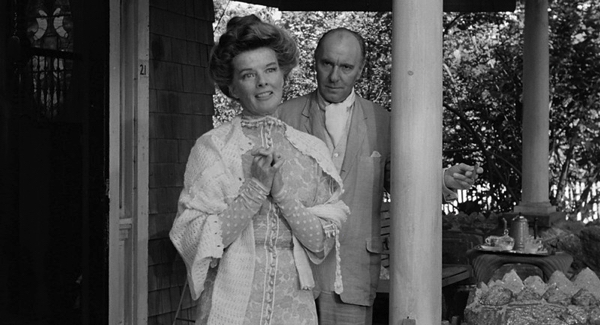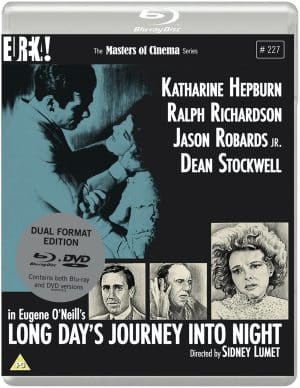
Dir.: Sidney Lumet; Cast: Katherine Hepburn, Ralph Richardson, Jason Robards, Dean Stockwell; USA 1962, 174 min.
 Nobel literate Eugene O’Neill (1888-1953) wrote Long Day’s Journey into Night in 1941/42. He stipulated that the highly autobiographical play should not be staged until 25 years after his death. But his widow Charlotta Monterey was so impressed by Lumet’s stage production of late husband’s play The Iceman Cometh she gave him the film rights despite higher bids from other directors. Trust the Swedes to get their paws on the gloomy Bergman-esque play), it premiered in in Stockholm in 1956, nine months before the first US staging in Boston and New York,
Nobel literate Eugene O’Neill (1888-1953) wrote Long Day’s Journey into Night in 1941/42. He stipulated that the highly autobiographical play should not be staged until 25 years after his death. But his widow Charlotta Monterey was so impressed by Lumet’s stage production of late husband’s play The Iceman Cometh she gave him the film rights despite higher bids from other directors. Trust the Swedes to get their paws on the gloomy Bergman-esque play), it premiered in in Stockholm in 1956, nine months before the first US staging in Boston and New York,
Set in August 1912, Journey follows one day in the life of the Tyrone family playing out in their house in rural Connecticut. This is a family in denial: Patriarch James (Richardson) is in his mid sixties and looks back on a long acting career channelled into one role, limiting him severely. His penny-pinching ways have caused his wife Mary (Hepburn) to become addicted to cheap morphine easing the pain suffered by the birth of their youngest son Edmund (Stockwell) – now in his early twenties. Their oldest son Jamie (Robards) is a drunkard and womaniser, trading on his father’s name to get on in the acting profession. He also suffers from tuberculosis – which the whole family fail to recognise. Now and again the truth rears its ugly head: Edmund being blamed for his mother’s trauma. Moody and melancholic, Mary is afraid her chronic depression and addiction will be the death of the family, not least because of their financial worries. Their story is an ongoing love and hate scenario par excellence.
Eugene O’Neill Sr. had a difficult relationship with his children: he disowned his daughter Oona in 1943, when she married Charles Spencer Chaplin, 36 years her senior – he was never going see to her again. Both his sons, Eugene Jr. and Shane, would commit suicide.
Lumet’s sensitive direction gives the actors plenty of freedom. Hepburn takes centre stage, whilst Richardson seems to stay on the back burner, veering erratically from an Irish brogue to Shakespearean declamation in his lowkey performance. Robards is bombastic and over the top, Stockwell’s Edmund feels rather out of place, given his meekness: certainly a rather unjustified self-portrait by the playwright. Lumet’s script sticks faithfully to the page, DoP Boris Kaufman (Twelve Angry Men) achieving an atmosphere somewhere between The Magnificent Andersons and The Glass Menagerie.AS
ON DUAL FORMAT (BLU-RAY/DVD) for the first time ever | MASTERS OF CINEMA SERIES | 16 MARCH 2020